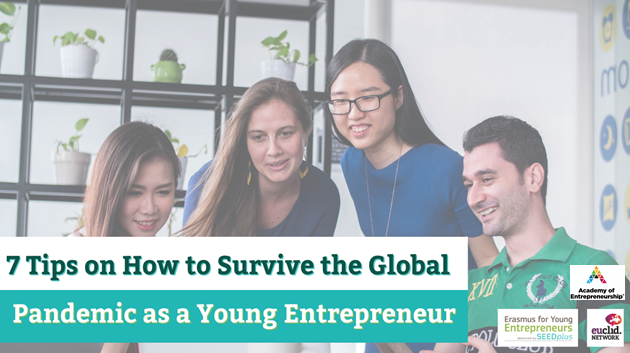7 Tips on how to survive the global pandemic as a young entrepreneur

The coronavirus pandemic is a once-in-a-lifetime crisis. Social entrepreneurs like you have been exposed to this unexpected situation which requires fast overhaul of business plans and substantial workplace changes. Underneath these disruptions lies the question of how can your business remain profitable while continuing to create value for your community. This can be overwhelming but do not worry! There are ways to mitigate the impact of the crisis on your business and even turn this slowdown into an opportunity.
Here are 7 tips and tricks on how to survive a global pandemic as a young entrepreneur:
- Take time to evaluate
To be clear, we are not suggesting a vacation – even though we could all use one right about now. This is not a time to stop! Nevertheless, it is worthwhile to slow down and take a moment to assess your situation. The first step is to identify the primary sources of revenue and value-creation and subsequent “now or never” moves that need to happen before the recovery fully starts. In other words, identify your business’ strongest points. This will help you focus your efforts and prioritise tasks based on their impact on your bottom-line.
- Be aware of your position in sector
Have a keen grasp of the ‘micro’ and ‘macro’ context of your industry. You need to be aware of your allies as well as of your competition. Start by studying those businesses that are thriving in the face of crisis and learn about what they’re doing differently. It is important to recognise indirect competition – meaning companies that solve the same problems but look completely different than yours. From there, it’s about identifying the needs for your target customer base, and catering to them with laser-like focus. When you have a strong standing, your business becomes significantly more attractive to investors and partners.
- Exchange skills with another entrepreneur in your field
Getting business of the ground, much less achieving any semblance of competitive advantage is difficult in the best of times. Once you understand your position in the market and the other players, it might be time to make friends. Identifying your competition is important but recognising potential for collaboration can be what saves your business. Entrepreneurs in the impact sector have the advantage of a common bottom-line – value above profit. Now more than ever, it is vital for complementary businesses to cluster together for the sake of ‘growing the pie’. Explore peer-to-peer learning opportunities, find new partners and get cooking!
- Be ready for the Pandemic Pivot
With little foresight into what the future will look like, your safest bet is to adopt a business model that allows for maximum pivot potential.One way to embrace flexibility in operations is by diversifying your output. On one hand, if your enterprise is struggling to survive, you might need to focus your efforts towards the most profitable ventures. On the other hand, communities around the world have new needs because of the pandemic. The ability to adapt and diversify your business will not only lead to a diversified revenue stream but also to ensuring more positive impact in society.
- Expand your network and finetune entrepreneurial skills
Entrepreneurs are an energetic bunch, always looking for new opportunities to pursue. Some business downtime might not be what you were looking for, but it can be a break to venture further and develop your skills. You don’t have to do it alone!The Erasmus for Young Entrepreneurs (EYE) is an EU-funded exchange programme for new, aspiring and experienced entrepreneurs of all ages. For new entrepreneurs, this is a great opportunity to learn from the best and enhance their business. For host entrepreneurs, this is a unique chance to get a fresh perspective, gain access to international markets and help the social enterprise ecosystem in Europe. Even during the pandemic, the EYE programme has continued its mission to provide cross-border peer-learning exchanges at no cost for those interested in social entrepreneurship. If this sounds like an option for you, let’s get in touch!
- Ask for Help
Social entrepreneurs have proven to be a force to be reckon with. You have maintained your business(es) and found new revenue streams when necessary, while playing a dynamic role in the crisis-response. Many social enterprises have taken off and managed to become profitable. Nevertheless, the impact community is still prepared to share resources and funding to help social enterprises survive. Do not hesitate to look for the tools and resources necessary to fulfil your mission!For example, an unprecedented collaboration among more than 40 global the COVID Response Alliance for Social Entrepreneurs is coordinating a response to help social entrepreneurs overcome the challenges brought on by COVID-19. If you are in need of funding, visit Covidcap.com, a searchable database of over $1 trillion in emergency relief funds, with support from a team of global consultants and volunteers, and in partnership with institutions worldwide.
- Keep Your Eyes on the Prize
The uncertainty brought about by the COVID-19 can put a strain on one’s ability to organise and remain centred. One noticeable characteristic of companies that can adapt well is that they have a strong sense of identity. What is the identity of your business? What is your mission? Social enterprises, more than for-profit organisations, have a sense of purpose in creating positive impact. Make sure that alongside profitability, you maintain your ability to create value. Your work matters for the communities you support directly as well as for the larger social-impact ecosystem in which you operate. We work together to create positive impact and move closer to achieving the UN Sustainable Development Goals.Entrepreneurship is an exercise in overcoming hurdles and adapting to new circumstances. The COVID-19 crisis is just that: a hurdle to overcome and a disruption of the “old normal” that can transform the ways we do business tomorrow. Impact-driven entrepreneurs like you have already demonstrated their ability to persevere during these difficult times. We have seen a surge in collective action, collaboration and innovation. Social entrepreneurs have assumed a role of primary response-actors, providing invaluable support and resources for their communities. This resilience of spirit brings proof that social enterprises will not only survive the pandemic, but that they can thrive through it.

